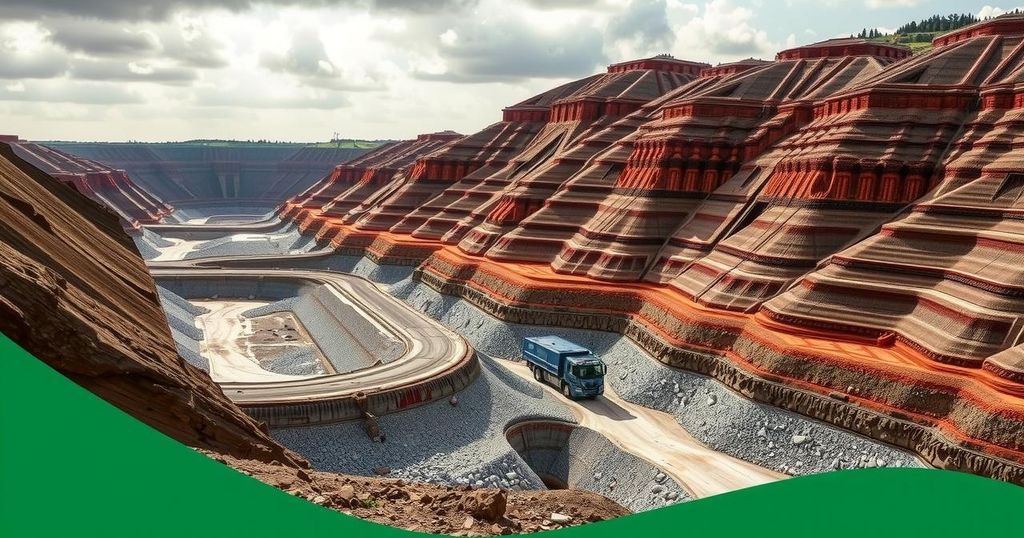Revitalizing Nigeria’s Mining Sector: Analyzing President Tinubu’s Initiatives

President Bola Tinubu’s administration is working to revitalize Nigeria’s solid minerals sector to diversify the economy and increase its GDP contribution. Key strategies include the establishment of Mining Marshals to combat illegal mining, the introduction of a Value Addition Policy, and the increase of mining rates to boost revenue. Significant developments include the inauguration of processing facilities and the revocation of dormant licenses. The minister indicates ongoing reforms will continue into 2025, aiming for long-term sectoral growth.
Upon assuming office on May 29, 2023, President Bola Tinubu articulated ambitions to elevate Nigeria’s economic landscape through the diversification of its mono-cultural economy, primarily by focusing on the revitalization of the solid minerals sector. Nigeria is richly endowed with 44 minerals in commercial quantities, including seven critical minerals essential for the global energy transition. However, the sector’s contribution to the country’s Gross Domestic Product (GDP) has traditionally remained low, prompting concerns from analysts.
In response to these challenges, the Minister of Solid Minerals Development, Dele Alake, declared a state of emergency in the sector, attributing its struggles in part to illegal mining operations that purportedly fund banditry and disrupt revenue generation. To combat these issues, the Nigerian government implemented a dual-pronged approach, consisting of both coercive and persuasive measures. A special security outfit, Mining Marshals, has been established to safeguard mining sites, resulting in the arrest of over 300 illegal miners thus far.
Alongside the strategies aimed at enforcing compliance, the government has sought to formalize the activities of artisanal miners by establishing 250 cooperatives to assist their transition into legal operations. Additionally, the Value Addition Policy introduced by Alake mandates that all mining companies submit detailed plans for adding value to minerals before obtaining licenses. This policy is complemented by recent infrastructural developments, such as the inauguration of an ultra-modern laboratory in Niger State and new processing facilities in Nasarawa, aiming to enhance mineral processing capabilities.
In a bid to consolidate the economic framework of the mining sector, increased rates and charges for mining activities were instituted in July 2024. This initiative is designed to boost national revenue, particularly from critical minerals like lithium and gold. Furthermore, to address inefficiencies in mining operations, 924 dormant licenses were revoked in April 2024, thereby fostering an environment for foreign direct investment and enhancing sector viability.
The contributions of the mining sector to the GDP increased from ₦1.66 trillion in 2022 to ₦1.76 trillion in 2023, reflecting potential for further growth if strategic challenges, such as over-regulation and illicit mining, are mitigated. Stakeholders have lauded the Federal Government’s decision to lift the mining exploration ban in Zamfara, recognizing that illegal operations had previously capitalized on the hiatus, depriving the country of significant revenues.
Industry conferences in 2024 focused on technological innovations and partnerships to strengthen the sector, indicating a collective enthusiasm for advancing Nigeria’s mining potential. Stakeholders express cautious optimism regarding the current administration’s measures to reform the solid minerals sector while urging for consistent implementation of policies and programs to sustain momentum into the future. The Minister of Solid Minerals Development has assured that further reforms are anticipated in 2025, which aim to build on the strides made in 2024.
The Nigerian economy has long relied on oil and gas, but President Bola Tinubu’s administration recognizes the potential of the solid minerals sector as a means to diversify revenue streams and bolster economic stability. Given Nigeria’s vast mineral wealth, the government has prioritized the promotion of sustainable, responsible mining practices that can contribute significantly to the GDP. The challenges posed by illegal mining and insecurity necessitate urgent intervention to harness the sector’s capabilities while ensuring compliance with regulations.
The ongoing reforms under President Tinubu’s leadership mark a critical juncture for Nigeria’s mining sector, reflecting a strategic shift toward increased revenue generation and investment attraction. The government’s dual approach of law enforcement and miner formalization aims to stabilize the sector, while newly introduced policies and infrastructure invite optimism about future growth. However, sustainable success hinges on consistent implementation of reforms and addressing existing bureaucratic hurdles to capitalize on Nigeria’s mineral wealth effectively.
Original Source: nannews.ng








